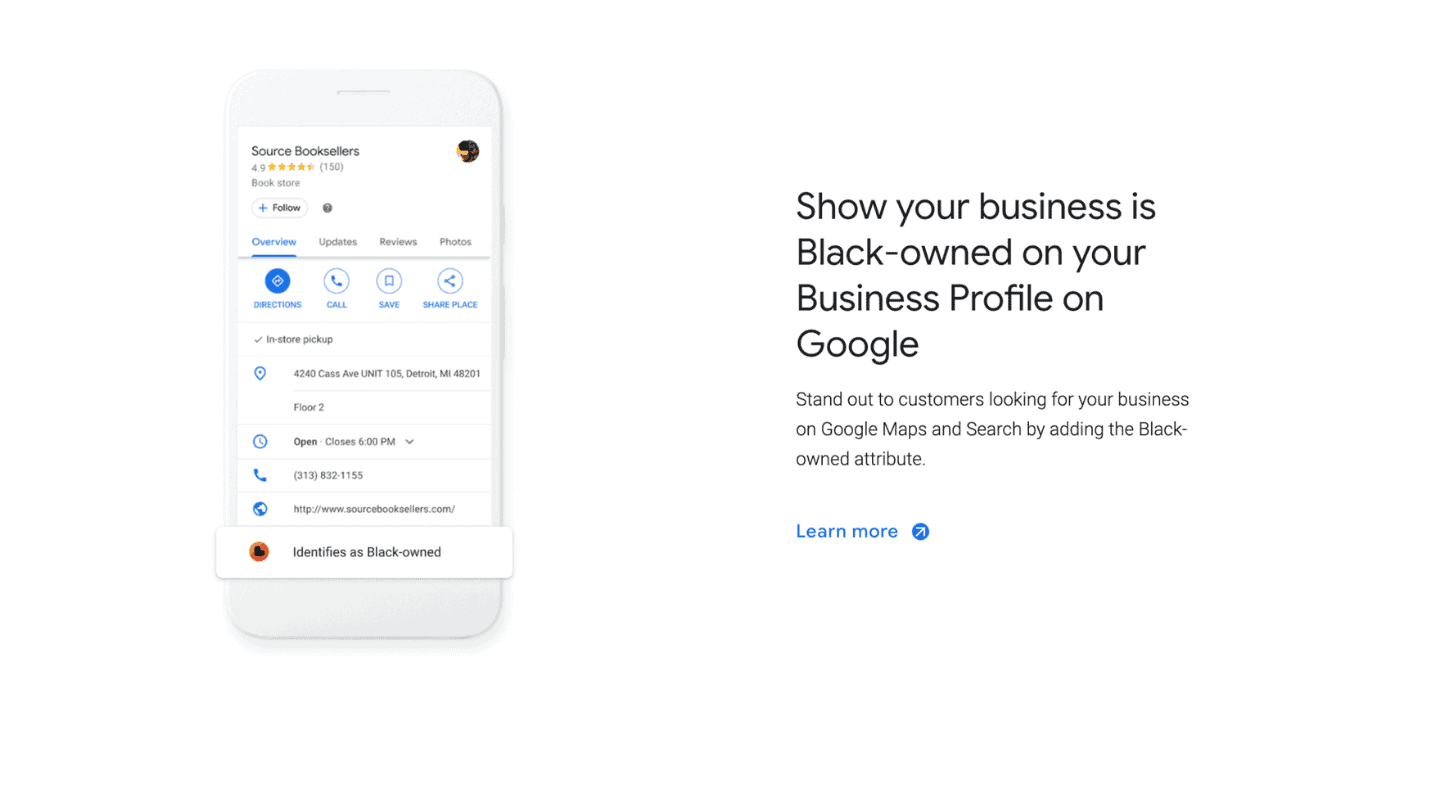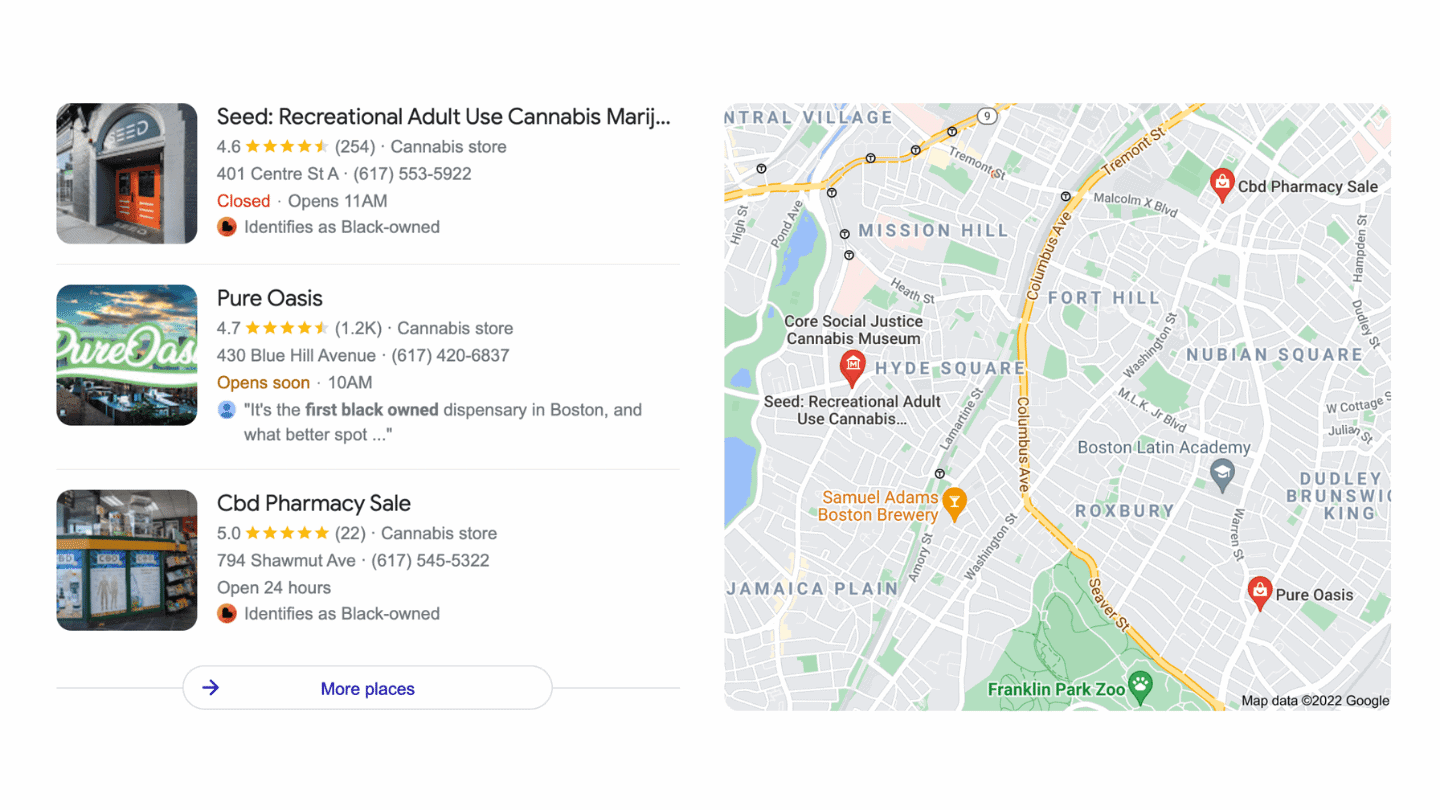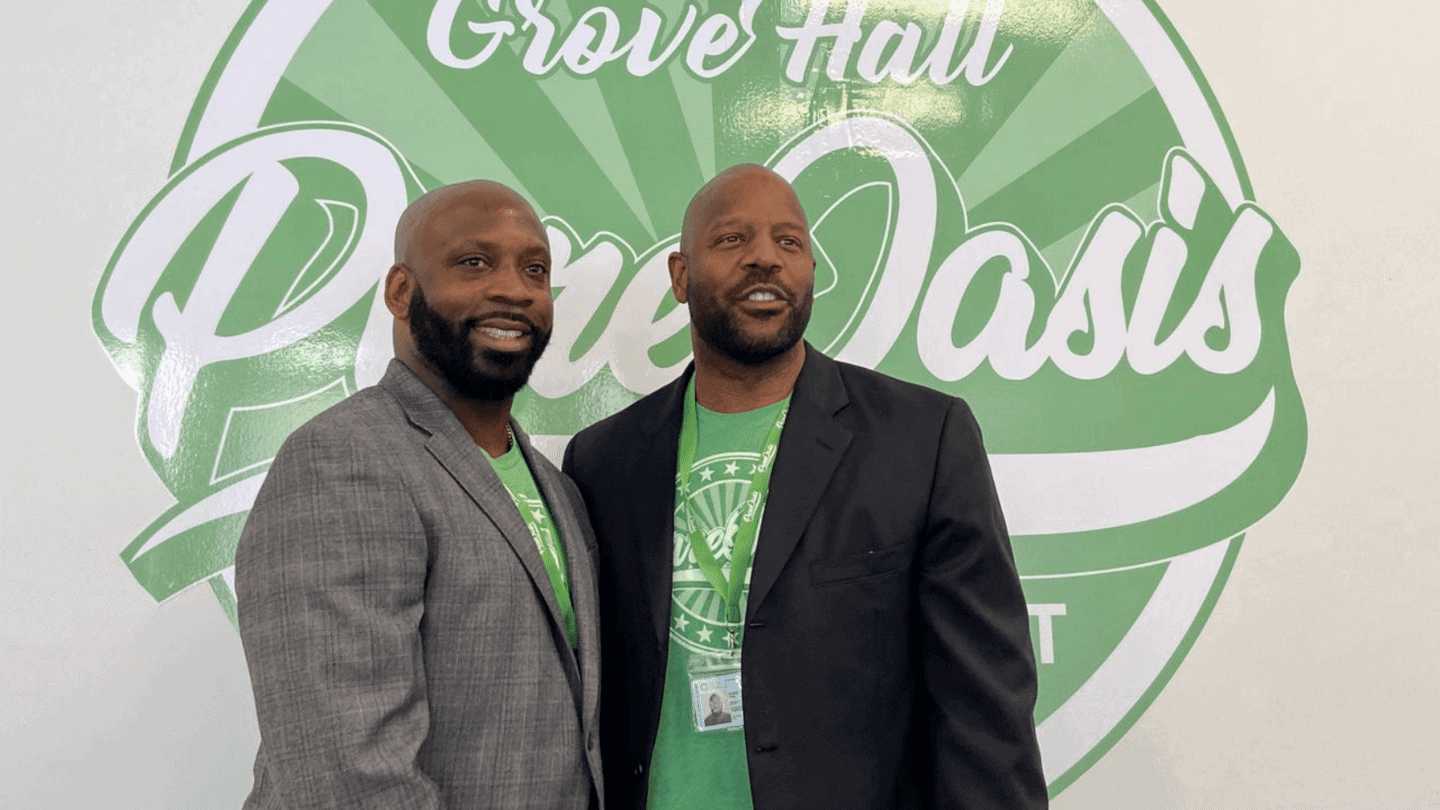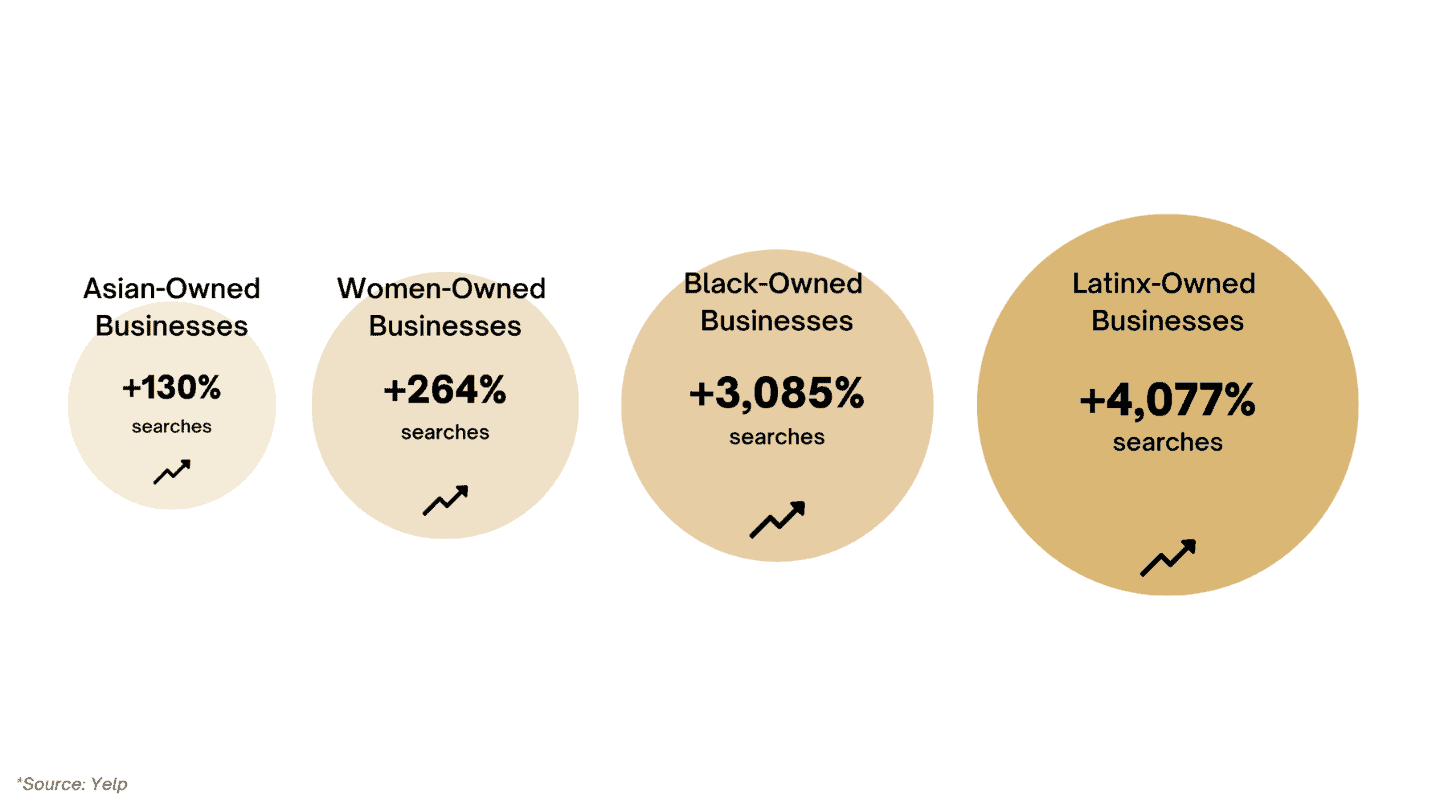
From Yelp and Instagram to now Google, business platforms and tools are amplifying businesses owned by marginalized communities.
At the end of 2021, Google launched a new feature allowing businesses to add a “business identity attribute” to be displayed in the “Shopping” tab. As of January 2022, identity options include:
- Black-owned
- Latino-owned
- Veteran-owned
- Women-owned
Selecting a business identity attribute shows customers a corresponding icon on your product description pages in Google Shopping. This also gives those searching the power to filter for businesses by identity attributes.

And Google is hardly the first to do it. Instagram announced a similar feature in June 2021, stating:
“In the last year, the Instagram community has come together in support of Black-owned businesses, and businesses have found creative ways to be discovered. Last summer through fall, there were over 1.3 million Instagram posts in support of ‘Black-owned’ or ‘Black-led’ businesses. And the number of businesses located in the US with ‘Black-owned’ or ‘Black-led’ in their profile increased over 50%.”
These features allow businesses to proudly show customers who they are. In fact, adding attributes to your brand’s core messaging is a great way to personalize your business for customers and even give yourself a competitive advantage.
Do customers really care if you’re Black-owned?
From the #MeToo movement in 2017 to the reignited Black Lives Matter protests of 2020, social justice outcries have always sparked viral discussions about taking action towards building equity.
The data says it all:
- A 2020 report from Yelp showed that following the death of George Floyd, there was a 7,043% increase in searches for Black-owned businesses on its platform, compared to the same period in 2019.
- Yelp’s 2021 Local Economic Impact Report showed that this was hardly a short-lived trend. Searches for what they categorize as diverse businesses (Asian, Women, Black, and Latinx-owned) grew by 2,930%.

- According to a 12-month graph from Google Trends, the search term “Black owned” reached a value of 100 (the peak popularity for a term) following the death of George Floyd.
Long story short: Yes, customers care where and who they shop from.
Why do customers care?
Two words: conscious consumerism.
The foundation of business is to provide a good experience. The foundation of shopping is to choose amongst the experiences provided. Where consumers spend their hard-earned money is a uniquely individual decision.
As the world events around us inspire change and a new generation of consumers ages in, shoppers are making these purchase decisions increasingly based on values. From environmental sustainability and women empowerment to diversity and inclusion, consumers are using their buying power to create change.
According to Globe Newswire, Gen Z currently accounts for 40% of buyers and will be the most values-aligned consumer to date. Nearly two-thirds of Gen Z consumers are willing to spend up to 48% more to buy from a purpose-driven brand, as well as willing to make 20% less in salary to work for one.
Conscious consumers are here for the long haul, but that means diversely owned businesses need to be easier to find.
TIME author Alana Semeuls wrote about her experience committing to a week of only spending money at companies run by women. In the article, Semuels reflects on why she took this week-long vow in the first place.
She writes: “If I really wanted to see more women in charge, didn’t I have a role to play in making this happen?” What’s more, which Semuels emphasizes, is that it is extremely difficult to actually find women-owned businesses.
This thought process is no different for those in the cannabis industry. If we want to see more social equity, it starts with amplifying those businesses.
The Impact of the Buyer’s Dollar
Investing in the economic empowerment of marginalized communities by purchasing from their businesses drives growth for their families, communities and local markets.
Voting with the buyer’s dollar helps begin the shift in mindset needed to address systemic inequities that have been generations in the making for the Black, Latino, Asian, Veteran, LGBTQ+, female, etc. communities.
For instance, the generational wealth gap between Black and white Americans has been well documented. According to a report by the Institute for Policy Studies,“the median black family today owns $3,600 — just 2 percent of the wealth of the median white family.”
This wealth gap consequently results in more difficulty accessing capital or cash flow. According to a Fundera Report, women entrepreneurs in 2021 still faced challenges getting fair access to capital, being offered smaller loans with significantly higher interest rates than men. Similar research exists for Black-owned businesses and their access to capital.
For this reason, there is an important distinction in where money is going when consumers spend at diverse businesses versus non-diverse ones. When they shop Black, their money is supporting the Black community. When they shop from women, it is reinvested up to 90% into families and communities, compared to a mere 30-40% for men.
A great example is Cannabis Creative’s very own client, Pure Oasis, Boston’s first recreational dispensary. Pure Oasis is owned and operated by two Black men.
Co-Founder Kobie Evans spoke to Filter Magazine, saying:
“We both grew up in the inner city, with the first-hand experiences of over-policing and the damage of the War on Drugs in our communities…We want to inspire others by demonstrating that we are from this community and can be successful business people…We want to open an incubator to work one-on-one with people from disadvantaged communities in Massachusetts, and help them realize their goal of owning a business and building generational wealth.”

While changes in individual behavior will not close the gender or racial wealth gap (only policy change can do that), money talks. When an entire economy of consumers shows what they care about, policymakers tend to listen.
This movement of conscious consumerism is not just about providing space on the shelf and giving more options to buyers. It’s about promoting representation across industries and supporting financial equity across marginalized communities.
So do customers really care if you’re Black-owned? Yes.
By putting your Black, Women, Latino, Veteran, or Minority-owned status out front in your messaging, marketing materials, and conversations, you are adding a personal touchpoint for your employees, colleagues, and customers.
How to add an attribute to your Google Business page
- Click the tools icon in the top right corner of your Google Merchant Center account.
- Navigate to the “Business information” page.
- On the “About your business” tab, scroll down to the “Business identity attributes” section.
- Toggle the button next to the appropriate identity attribute to turn it on or off.
- Check the box next to “Include my business in promotions for…” if you’d like your business and products to potentially appear on pages featuring the selected identity attributes.
None of these attributes apply to me. What can I do?
Amplify your fellow business owners – authentically. Build genuine relationships with their leadership and ask how you can help each other. Do the work to educate yourself and provide value above all.
Here are three easy ways you can amplify diverse-owned businesses in your local community or industry:
Partner with them
Joining hands with other local businesses is good for your business and your community. It is also a great way to promote diverse businesses and their missions, whether they are your competitors or not.
Consider partnering with them by:
- Collaborating in running community or promotional events
- Making donations or offering a company-match to their philanthropic causes
- Swapping promotional flyers to display around your dispensary
Engage with them on social media
Your online presence is just as powerful as your brick-and-mortar experience. Amplify Black-owned (and other diverse-owned) businesses by:
- Starting meaningful discussions online about diversity in cannabis
- Co-hosting social media events (Instagram or YouTube Live, Clubhouse, Twitter Spaces, etc.) to network within the industry
- Running giveaways, contests, or other fun online campaigns together
Be aware of your impact
Business identity attributes are an extremely valuable tool for business owners and consumers alike. However, the constant grouping of brands by these attributes on dedicated lists or sections of a website or retail store sends a problematic message.
While these “roundups” make it easier for customers to identify and support brands that align with their values, it is important to showcase, support, shop, and talk about brands simply because they are good at what they do, rather than only because they are Black-owned (or Latino-owned, Minority-owned, Women-owned, or Veteran-owned).
Be aware of your impact (no matter your intent) when supporting your community of fellow business owners.
Learn more about diversity and inclusion in cannabis
Educating yourself is key to being a strong ally and advocate for diversity and inclusion in the cannabis industry. For more on this topic, explore our Diversity & Inclusions blog section.

